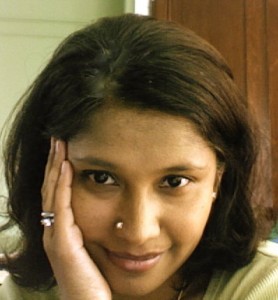By Chaumtoli Huq
Last year, on June 27, 2013, I visited the site of the Rana Plaza building collapse in Savar, Bangladesh, two months after the death of over 1,100 workers. A mother stood looking at the site, mourning the death of her daughter who worked in the garment factory. Fixated on the debris, that had not yet been fully cleared, and by then covered by rainwater, she feared that no one would remember her daughter. Other family members at the site surrounded me as they saw my camera, and learned that I was a researcher from the United States. They urged me to take pictures of the photographs of their daughters, wives, sisters they carried in their hands. The request seemed curious – to take a picture of a picture – perhaps they hoped then one other person might record and therefore remember their family member. It is as if they felt their own “recording” through photographs of their family members was insufficient. This scene reminds me of when I would interview workers for a case, and they would share in detail what happened, but then would end with the statement: But I have no proof. I open with this story because it foregrounds the importance of recording, researching, remembering, and underscores the value of the researcher/scholar being on the “ground”.
Anonymity of globalization must be one of the most disempowering experiences for workers. The family members at the site understood intuitively that individualizing and humanizing the loss of life might lead to changes in the industry’s conditions. The garment industry’s structure, where global retailers contract with local factory owners and workers do not have a voice at the table to negotiate working conditions, places workers in vulnerable positions in terms of improving workplace standards. Global retailers deny accountability by placing blame on powerful garment factory owners or Bangladesh local labor laws, but then garment factory owners shift blame to buyers for demanding cheaper prices, which in turn depresses local wages. In this shifting accountability game, workers are unable to control basic aspects of their workplace conditions such as safety. The workers of Rana Plaza and other industrial accidents demand a rigorous examination of effective solutions so that such tragedies do not reoccur.
For the next nine months, I will spend time in Bangladesh as an American Institute for Bangladesh Studies (AIBS) Fellow investigating how labor conditions have improved since the implementation of the two international agreements, Safety Accord and Safety Alliance. My proposal seeks to interview all relevant stakeholders in the garment industry, with a particular emphasis on workers who are the intended beneficiaries of these agreements. I hope to explore safety issues, but also to engage in broader conversations around workers’ rights and the labor movement. Through this blog, #labordispatches, I will share my observations.
I am often asked what is my goal in this research – will I publish, will I advocate. Surely, if policy proposals emerge from the research, those should be explored, and I will note down observations from my work. However, I am seeking to enter this research project with an open mind. This does not mean I erase my own lived experiences, but will make a research intervention that allows for stakeholders to articulate their own agenda. In this respect, I find useful Professor Gayatri Spivak’s phrase: ”rearrangement of desires” as describing my task as a researcher here. That is I cannot say that I am arriving from New York to Dhaka for this short time to help or advocate for workers because there already exists a vibrant labor movement in Bangladesh. To begin my research with a notion of advocating for (read representation) or doing something for presumes that I articulate what changes are needed. To impose my views seems least aligned with my overall intention to bring to the forefront workers’ voices.
That I am entering a vibrant movement for labor rights was evidenced when arriving in Dhaka, a little over a week ago. A massive hunger strike was underway by 1,600 Tuba Group workers for the owner’s failure to pay wages and Eid bonuses. The owner of the Tuba Group, Delwar Hossain, is the same owner of Tazreen factory where 112 workers died in a fire. He was in jail since February 2014 for his involvement in the fire, but was released on bail on August 5. Recently, the owners paid the Tuba Group workers their salary due to their action. It remains to be seen what are the next steps for the workers.
Given this context, what I can do through my research is perhaps create possibilities for the “rearrangement” of dominant ideas so that certain political imaginations may emerge such that workers could articulate and advocate for themselves as to what needs to be done. To want to document or be descriptive here seems to be pejorative for the “scholar” who should have an “agenda” and individuate herself. But for now it seems to be the most honest theoretical position to take. To be clear, this does not mean there is no practical organization to my project. It is just that I am not organizing my research around certain preconceived premises or objectives. In this regard, such an approach seems least coercive, as a democratic scholar. Further, such an approach employs a theory of marginality that I seek to put into practice not only in the content, but also in the methods of my research.
The research fellowship is funded by the American Institute for Bangladesh Studies (AIBS)
Follow me @lawatmarginsFacebook: https://www.facebook.com/groups/371477246304086/






Open mind approach is the best. Scholarly approach is usually fr the benefit of the scholars fr themselves.The already fierce labor movement ides among garment worker’s thought ‘Rearranging’ democratically and bringing it to the forefront; the best approach yu can take.
Chaumtoli Huq,
I’ve only found this way to contact you 🙂
(by twitter they favourited the tweet…)
Like I’ve tried to tweet: the url for the Tuba photo’s does not work…sorry.
Can you send one or more photo’s by mail?
Do you know the last 7 demands of the Tuba workers?
It is for this page: http://dressedandstripped.nl/2014/07/24/tuba-garment-workers-strike-tazreen-bail-20140724-now/
Or do you know where-how to contact them by mail?
(btw I’ve post a part of your article in todays bulletin.)
Kind regards,
jaap
Your commitment to democratic scholarship is so refreshing! (and I’m sure appreciated by those who you come into contact with) Thank you for honoring the humanity and authority of those who allow you to share in their sojourn.
I do have a question though. I’m curious to hear your thoughts on how democratic scholars can avail themselves to accountability to the principles of democratic scholarship being that it can be so easy to fall back into imperial and colonial discourse/engagement.
Blessings on your fellowship and I pray that your open mind is nourished by many invigorating surprises while there!